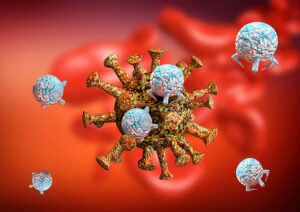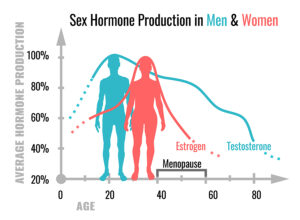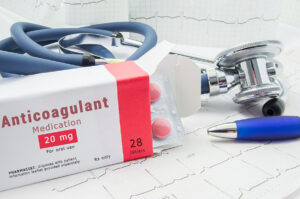This article is about immune responses against Covid-19 or anti-Covid vaccination.
Investigations of the immune system showed that people who had Covid-19 and subsequently were vaccinated had an immune response that lasted for at least one year. In the following a discussion follows about the details why this is so.
The WHO confirmed more than 430 million cases of Covid-19 since the pandemic started. 4.9 billion people or 63.9% of the world population received at least one vaccination as of late February 2022.
How vaccination against Covid-19 works
The vaccine attacks the spike protein of the Covid-19 virus (SARS-CoV-2). The body produces antibodies through B cell activation. These are lymphocytes that originated from the bone marrow (hence B cells). They are capable of producing large amounts of antibodies that target the spike protein of the virus. It takes at least two vaccinations with the Pfizer vaccine to get a good antibody response. A booster vaccine brings the antibody titer even higher.
Cell-mediated response by killer T cells
When the virus enters a cell, the antibodies are no longer effective. Here the T killer cell comes into play. T killer cells are lymphocytes that were thymus processed (hence the name T cells) and activated by the vaccine. T killer cells function as a second line of defence. These immune cells specialize in detecting virus-infected cells. They immediately destroy these cells before the virus has a chance to replicate and shed more virus copies into the blood stream. It is the T cell response that prevents hospitalizations and deaths. Media coverage misled the public to believe that the bulk of the immune response would be from antibody production. However, the truth is that the T cell response is what is responsible for recognizing Covid-19 variants and why people survive Covid-19 with very little complications.
Long term immunity
When people had a Covid-19 infection the activated B cells that produced antibodies and the T killer cells get converted into memory cells. With a re-infection the memory cells can reactivate themselves to turn again into active B cells producing antibodies and T killer cells. The key for immunity with multiple vaccinations is also the memory cell pool. Those with two Pfizer vaccinations and a booster vaccine are much more immune to Covid-19 than those who only received one or two vaccinations.
Waning immunity
Following an infection with Covid-19 the immunity comes to a peak at 3 months after the start of the infection. The CDC said that people who are 90 days post-infection do not require a quarantine when they meet someone with an active Covid infection. By about 6 months immunity is declining. This is also true for people after double vaccination and a booster vaccine.
Hybrid immunity
The immune response after either a natural infection with Covid or following vaccinations with anti-Covid vaccines lasts only about 6 months. On the other hand, scientists observed that people recovering from Covid infections who subsequently received an anti-Covid vaccine just once had a very strong immune response that lasts for over a year. This is called hybrid immunity. This type of immune response triggers a very strong antibody response that is lasting longer. Immunologists are now researching whether the hybrid immunity is achievable with an improvement to vaccines. Results of this will not be available for several years.
Conclusion
The immune response to Covid lasts for about 6 months; the same is true for the immune response after a vaccination. But when a person comes down with Covid and he or she receives a vaccination one month later, the immune response lasts for over one year. Scientists call this hybrid immunity. At this point experts recommend to have a booster vaccine every 6 months. But immunologists are researching for ways to incorporate the mechanisms of hybrid immunity into vaccines, which likely will not be available for several years.
Avoid deliberate exposure to Covid-19
Some persons who read about the response after a Covid infection and a vaccination misinterpreted this. They took this as an “invitation” to expose themselves to the virus in the hope to boost their immunity. However, a Covid infection remains an illness with potentially serious consequences. There is no way to predict whether the course of an infection will be mild or extremely severe. In addition, a significant number of patients come down with “long covid” and struggle with breathing problems, lack of energy and more. Covid is still here, and our best protection remains the full vaccination including boosters and hygienic measures. This involves masks, frequent hand-washing and disinfection of surfaces in daily life.









